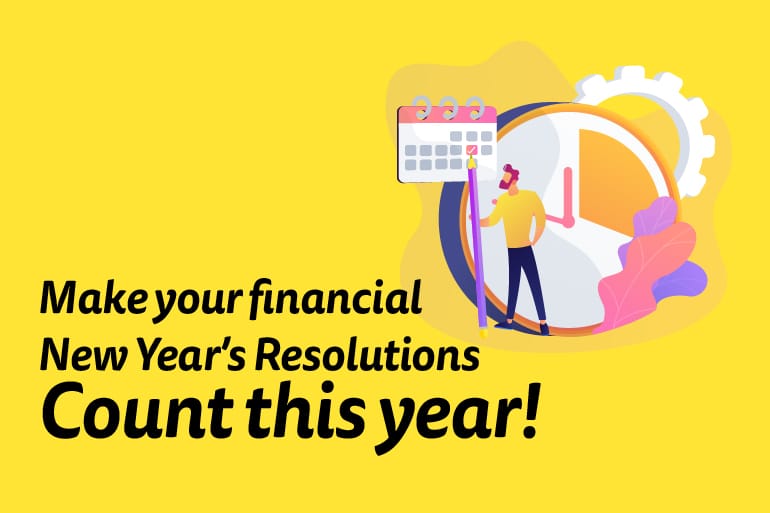Make your financial New Year’s Resolutions count this year!

As 2021 fast approaches, many of us will be happy to move on from a hugely unsettling year that was 2020, with the global pandemic leading to financial hardships, with many industries that would never have been thought to be vulnerable being hardest hit.
The only way forward is to have a positive attitude and gratitude for being in one of the least-affected countries in the world, with neighbours who are all basically on the same page in the fight to keep free from Covid-19.
If ever there was a time to take stock of our financial behaviour and areas of overspending, it’s now. We’ve come up with our five best tips for not only financially surviving in 2021, but thriving!
1. Crystal-clear goals
When it comes to making new year’s resolutions, the fastest way to fail is to fail to write them down in black-and-white. We tend to prefer to keep a vague mental list to help minimise feelings of failure when we do stray from our good intentions and fresh energy coming off a holiday break. Our advice for creating your financial resolutions are to keep it simple and realistic, keep it short (reduce to one sentence), and keep it going (don’t give up!). An example would be, “I will save $1,300 this year by saving $25 a fortnight from my pay”. The $1,300 will go a long way to relieving end-of-year stress when Christmas costs start cropping up.

2. Save automatically with a simple one-time setup
The example we gave in point 1 was of saving $25 every fortnight over a year. This could become quite a chore to have to do manually 26 times over, and easy to forget to do and ruin the whole process. It doesn’t cost anything extra with your bank to setup a regular money transfer between your accounts. You can login to your online banking and decide which account you want to become a dedicated savings account. Then you just have to create a recurring transfer to this account from your main account that your income comes into. For example, if you get paid every fortnight on a Friday, set up the $25 transfer to happen right after this, every time you get paid.
To do this, login to your internet banking and click the option to ‘transfer funds’. Set the ‘from’ account to your main one pay goes into, and set the ‘To’ account to the one you selected to be the savings account. Set the amount to $25 and the date to your next pay date (or the day after). Then for ‘Repeat’, choose ‘Every 2 weeks’ (or the equivalent for your bank, this is an option BNZ provides).

3. Get on top of your debt
Any set of New Year’s finance resolutions should include a commitment to manage debt as effectively as possible, whether it be paying off a personal loan, a vehicle loan, or a mortgage. It’s never fun to have to set aside time to focus on debt, especially when that new Netflix series is waiting, but it’s worth it in the long run, and a part of being a responsible financial adult. Make sure you resolve to have the attitude that it is NEVER OKAY to miss a scheduled repayment, and if you’re a bit hazy as to when everything is coming out, go down to your stationary store right now, buy a 2021 calendar, and mark out every payment date! Resolve to take pride in being someone who never misses a payment, and before long the size of your debt will have gone down with an accompanying rise in your sense of achievement and control over your finances.

4. Budget, budget, budget!
If you fail to plan, you plan to fail – never is this more relevant than when it comes to being careful with your finances and staying within your spending limits. You’ve heard of the Ice Bucket Challenge but are you brave enough to take the Spending Cringe Challenge? Login to your online banking and do a search in your main spending accounts for fast-food brands – it’ll be a massive cringe-fest unless you’ve had a budget in place that sets a clear limit on your non-grocery food spending. One way to achieve this discipline (and avoid the cringe-worthy online banking paper trail) is to withdraw cash when your pay comes in and put the money for each main spending category into its own envelope. If you only let yourself spend what’s in the envelope when you go out on a Friday or Saturday night, your bank account will look much healthier the next day, you won’t have blown your budget (this is my round everyone!), and you might also feel in much better condition too!

5. Educate yourself on all things financial
If you can remember back to your exam days (hopefully without too much trauma), you’ll definitely remember the ones you were worst prepared for. You certainly never expected to perform brilliantly if you’d barely cracked a text book during the year. The same can be said for financial literacy. If there is no new input going in to help increase your knowledge base, you can’t expect to suddenly start being a lot better with money. Unless you treat money skills like any other learned skill, you should expect to continue to make the same mistakes and bad decisions that you always have. The good news is that there is a vast ocean of useful resources available at no cost, and that’s just considering the internet. Add to that your local library and bookstores, friends, family and mentors, and you’re bound to find the help your need.




